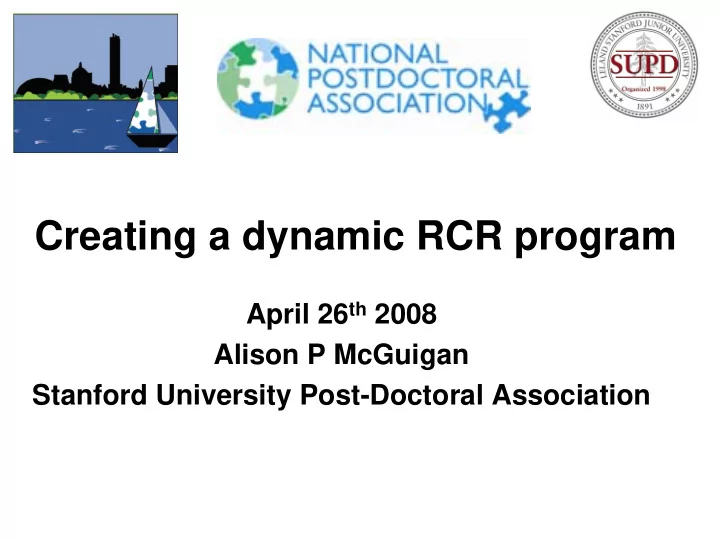

Creating a dynamic RCR program April 26 th 2008 Alison P McGuigan Stanford University Post-Doctoral Association
Program Title: “Soft” skills for post-docs: transition into a job successfully”
Motivation 1. Post-docs need a plan 2. Post-docs need new skills 3. Post-docs need to learn to be mentors
Program goals 1. Facilitate the development of a career progress plan 2. Provide training in: - mentoring - personnel management.
Program Structure • Series of three interactive workshops (each 3 hours) • Designed to integrate into Stanford Scientific Management Lecture Series (based on HHMI book “Making the right moves”) • Emphasis on active not passive learning • Focused on activity-based workshops as opposed to informational lectures
Workshop 1: Developing a career progress plan 1. What is a career progress plan? 2. How can I develop a long- term vision. 3. How can I solicit useful personal feedback from my mentors.
Example activities Small Group exercise : In 3 sentences or less describe: What you work on ? Why is it important ? Who cares ? Small Group exercise : Read sample research statements and for each identify: the major problem being addressed, why that problem is important, why anyone should care Role play activity: Mock career plan conversation between a Prof and a post- doc to demonstrate how to utilize document to facilitate difficult conversation
Workshop 2 Interviews and interviewing 1. Who do I need to hire? 2. How do I communicate who I want to hire? 3. How do I assess a resume? 4. How do I conduct an interview?
Example activities Small Group exercise : Design a job description for a post-doc or a lab technician for your lab Pair exercise : Develop structured interview plan then conduct a mock interview for a post-doc position. After mock interview provide feedback.
Workshop 3 Managing, motivating, and mentoring 1. What is good mentoring? 2. What motivates people? 3. Where are my mentoring strengths and weakness? 4. How are people different?
Example activities Small Group exercise : Identify a good mentor and list qualities of that mentor Small Group exercise : Use Herrmann Brain Dominance tool to identify what motivates you in your work and discuss in group what motivates different people Self Assessment exercise : Use coaching assessment tool to identify your strengths and weaknesses as a mentor
Project management strategies • Team of 5 people with weekly meetings • Have a clear idea of program learning objectives • Online Google shared documents and calendar • Educate the speakers on the post-doc audience • Use HMMI guide to developing training programs
Program publicity and advertising • E-mails from Dean’s office promoting the event • E-mail from SUPD encouraging registration. • Promoting event in weekly post-doc orientation • Created link from SUPD webpage describing program
Program outcomes Overall workshop rating Workshop Excellent good average poor I would recommend 1 82 18 0 0 100 2 35 62 4 0 100 3 65 30 4 0 96
Program outcomes Workshop 1 “This workshop was really helpful for postdocs going into academic positions, and communication with mentors/advisors about job advancement and postdoc career development. It would be nice to have something geared towards industrial positions as well” Workshop 2 “Very good not only in terms of tactics but also philosophy, attitudes and hearts.” Workshop 3 “Outstanding presentation. The best of all workshops. Very interactive. Provided skills with immediate applicability”
Optimize Program Impact beyond RCR • Promote the profile of post-docs, the PDA, and the NPA in the community and beyond. • Highlight the importance of mentoring and appropriate RCR training to the community. • Sent the NPA press release about seed grants to campus newspapers.
Lessons learned • Exploit networking opportunities and other programs • Have a clear idea of what you want in the program and communicate it to speakers • Remember the official stuff – agree to dates, expectations, honorariums etc in advance in writing • Think about logistics – parking, maps, rooms, timing • Interactive sessions very popular • Enthusiasm makes a big difference!
http://SUPD.stanford.edu SUPD Organizing Team Workshop 1: Mediators • Sruthi King • John C. Boothroyd • Sarah Kummerfeld • Susan McConnell • Alison McGuigan Workshop 2: Mediator • Susan Moore • Aliki Helman SPHR • Carlos Pineda Stanford OPA sponsors Workshop 3: Mediators • Anne Griswold • Chequeta Allen • Teri Hankes • Sonya Moore-Wells NPA “Bring RCR home” program: Kathleen Flint
RCR topics addressed • Management • Lab values and academic environment • Mentor responsibilities • Communication and difficult conversations.
Recommend
More recommend